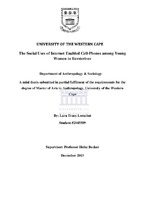| dc.description.abstract | The central research question this thesis explores is whether or not the availability of new social media alters the concepts of gendered personhood in working-class neighbourhoods on the Cape Flats. The arguments I will present all speak to my central argument that there is not only a relationship between “good” daughterhood and new social media, but that this relationship consists of young women in Cape Town namely Eersteriver, using their internet enabled cell-phones as a means of exploring the social and virtual realm without putting their title of a “good” or “respectable” girl at risk. I will incorporate comparative arguments from different bodies of academic literature which speak to the key question and arguments presented in this thesis so as to provide a global perspective. A brief socioeconomic
history of the area will also be included in this thesis so as to provide some
social context for my research. This thesis shows how young women of Eersteriver use the freedom, privacy and anonymity that they believe the internet and social media freely offers, to push the boundaries of good daughterhood and respectability. This thesis further demonstrates how social media have changed young women’s understanding of what social interaction is as well as their “doing” intimacy. I further show that their very interaction via their internet enabled cell-phones is a social form of gift giving. This research is particularly important because it is located at the intersection between gender issues and the study of new social media. This study explores how new gendered subjectivities emerge from performances and representations of personhood in new social media such as WhatsApp and Facebook, and how understandings of “good” daughterhood and respectability are altered and thus crafted into these practices. Literature in this area of research is still on the rise, so I am confident that this study will make a valuable contribution to this growing body of literature which speaks to young women and new ICTs. | en_US |

